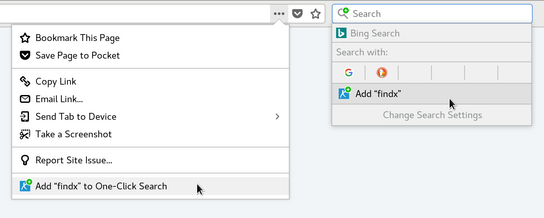Firefox removed the separate search field from the address bar in Firefox 57. With it, Firefox also removed the ability to discover and install new search providers from the websites you visited. Firefox 61 reintroduces OpenSearch but it’ll be harder to discover it than in earlier versions.
OpenSearch is an open standard for expressing how a search client (like a web browser) can communicate with a search provider. Your web browser has a few built-in defaults, but you can use OpenSearch to install additional search engines.
Firefox 56 and older versions used to mark the search icon in the search field with a green notification badge to indicate that it had detected an OpenSearch provider on the current website.

Comparing the user-interface for OpenSearch discovery in Firefox ≥ 61 (left) and Firefox ≤56 (right).
Firefox 61 will reintroduce the capability as a new menu item in the Page Actions menu (the three dots to the right inside the address field). There’s no notification badge on the Page Actions menu to indicate to the user that a new search provider is available for the current website. The new user interface also says where the search provider is being added, rather than just saying that it would be added in some capacity like the old version did.
Firefox 61 is expected to be released at the end of .
Microsoft Edge, Google Chrome, and Safari all automatically detect and install OpenSearch providers.
Microsoft Edge and Google Chrome adds discovered search providers to a list of optional search providers inside Settings. Both browsers let you change the browser’s default search engine to one of the previously discovered search engines.
In Safari, you’ll get the chance to search directly on websites you’ve previously visited when typing their name or domains in the address field followed by a search term. Safari’s approach helps to decentralize search by routing search directly to other websites instead of a generalized search engine provider like Bing or Google. You’ll be able to search for movies and TV shows directly on the Internet Movie Database website from the address field in Safari without going to an external search engine first.
I wish Mozilla had learned a lesson or two on how to do this from Safari. The leading search engines in the market has way more control over our online habits and which websites we visit than they’ve any right to. If you begin your search with “YouTube” than Firefox should, as Safari do, provide a method for searching on YouTube directly without involving another search engine.
Notably, Mozilla is funded by partnerships for the position to be Firefox’s default search provider in key markets. It would be a treat to the organization’s funding if they were to begin diverting search traffic away from their partners and onto other websites instead. Apple has no such concerns with Safari and are happy to provide people with alternatives instead of funneling all their users to their main competitor Google.
